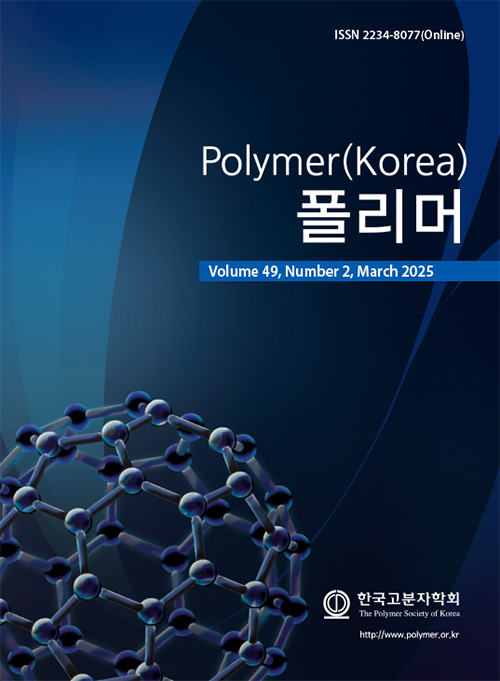- Modeling of Relaxational Behaviors of Crosslinked Polymer Networks with Dynamic Covalent Bonds
*Department of Chemical Engineering, Dong-eui University, 176 Eomgwang-ro, Busanjin-gu, Busan 47340, Korea
**Center for Brain Busan 21 Plus Program, Dong-eui University, Busan 47340, Korea- 동적 공유 결합을 갖는 가교 고분자 네트워크의 완화 거동 모델링
*동의대학교 화학공학과, **동의대학교 BB21+ 사업단
Reproduction, stored in a retrieval system, or transmitted in any form of any part of this publication is permitted only by written permission from the Polymer Society of Korea.
Thermosetting polymers are extensively used in various industries, including shipbuilding, automobiles, and batteries, due to their excellent mechanical properties and chemical resistance derived from their crosslinking network. However, crosslinked networks of polymers are generally considered be irreversibly formed; thus, recently significant attention has been given to covalent adaptable networks (CANs). Still, the mechanisms and dynamics of the bond exchange reaction (BER) are yet unknown, and also the molecular modeling approaches for BER vary across previous studies. Therefore, this study aims to describe BER in crosslinked polymeric systems via nonequilibrium molecular dynamics (NEMD) simulations. Specifically, the stress behavior of these systems is examined by quantitatively analyzing the degree of BER in conjunction with structural and rheological properties. These finding would provide insights into the intrinsic molecular mechanisms and physical origin of CANs.
열경화성 고분자는 가교 구조로 인한 우수한 기계적 특성 및 화학적 저항성 등에 의해 다양한 산업에서 널리 사용되고 있다. 그러나 일반적으로 가교 구조는 비가역적으로 형성되므로, 최근에는 공유 적응형 네트워크가 주목받고 있다. 하지만 결합 교환 반응의 메커니즘과 동역학은 여전히 명확하게 규명되지 않았고, 분자 모델링 접근법 역시 이전 연구마다 다르다. 따라서 본 연구는 비평형 분자동역학 시뮬레이션을 통해 가교 고분자 시스템 내 결합 교환 반응을 모사하고자 하였다. 특히, 구조적 및 유변학적 특성과 관련하여 교환 반응 정도와 함께 정량적으로 분석함으로써, 가교된 고분자 시스템의 응력 거동을 규명하였다. 이러한 발견은 CAN의 분자 메커니즘 및 물리적인 기원에 대한 중요한 통찰을 제공할 수 있을 것이다.
Keywords: molecular dynamics simulation, stress relaxation, covalent adaptable networks, dynamic covalent bonds.
- Polymer(Korea) 폴리머
- Frequency : Bimonthly(odd)
ISSN 2234-8077(Online)
Abbr. Polym. Korea - 2024 Impact Factor : 0.6
- Indexed in SCIE
 This Article
This Article
-
2025; 49(2): 261-266
Published online Mar 25, 2025
- 10.7317/pk.2025.49.2.261
- Received on Dec 2, 2024
- Revised on Dec 9, 2024
- Accepted on Dec 9, 2024
 Correspondence to
Correspondence to
- Sohdam Jeong
-
*Department of Chemical Engineering, Dong-eui University, 176 Eomgwang-ro, Busanjin-gu, Busan 47340, Korea
**Center for Brain Busan 21 Plus Program, Dong-eui University, Busan 47340, Korea - E-mail: sohdam@deu.ac.kr









 Copyright(c) The Polymer Society of Korea. All right reserved.
Copyright(c) The Polymer Society of Korea. All right reserved.